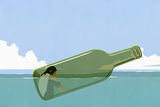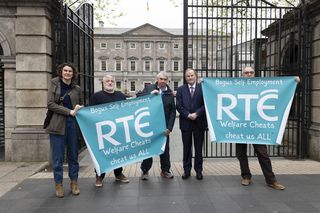Ireland keeps dieting but we continue to get bigger
Ireland was found to be one of the tubbiest nations in Europe this year and 2015 does not seem it will be any better. Deirdre Reynolds looks at our obsession with diets and why we keep on getting bigger.
Ireland was named one of the most overweight countries in the world
By now, most of us are well on the way towards packing on the extra 6lbs gained by the average person over the calorific festive season.
With a single mince pie containing up to 350 calories, some will have gorged on around 7,000 calories on Christmas Day alone - almost three times recommended daily allowance for men - new research shows.
In the year when Ireland was found to be one of the fattest nations in the Western World, experts say it's one turkey-and-stuffing sandwich too many.
"For many people, much of the pleasure of Christmas is associated with eating and drinking with friends and family," says nutritional therapist Heather Leeson. "But even having just one mince pie and alcoholic drink every day in December can add up to several extra pounds on the scales by January 1."
Read more:
Earlier this year, research published by medical journal The Lancet revealed that almost 51pc of Irish women and 66pc of Irish men are now classed as either overweight or obese. Compared to the European average of 47pc, Weekend Review reported how it makes us one of the tubbiest nations in the EU.
And things aren't shaping up much better for the next generation, the study funded by the Bill and Melinda Gates Foundation also found, with 26pc of under-20s here now overweight or obese - 2pc higher than the European average.
"Obesity is like a contagious disease," explains Leeson, director of Glenville Nutrition Clinics in Ireland. "We look around at what our friends look like, and what they're eating, and think, 'Well, everybody is the same as me, so it's fine' - when in fact, it's not."
Galway-based personal trainer Pat Divilly agrees: "We've got more low-calorie food than ever before and we're in the gym more than ever before, but we've gone the opposite way to what you would expect.
Read more
Read more:
"Ninety per cent of people who come into me say, 'I've tried everything. They've done low-calorie and low-sugar and low-carb [diets].
"But calorie counting isn't working. If the shakes and the pills and all these things that people have relied on for years worked, then we wouldn't be in the position we're in."
As the year in which we thought thin, while getting fat, draws to a close, losing weight remains the number one New Year's resolution for 2015, studies show.
As the average woman spends 31 years of her life on a diet, it's no surprise that that global diet industry is tipped to be worth €270bn by 2017.
Yet even mannequins here got bigger in 2014, after department store Debenhams debuted size 16 dummies, reflective of the typically sized female shopper.
But perhaps the most glaring example of Ireland's Supersize Vs Superskinny culture came in May, when the High Court granted doctors permission to tube feed a 26-year-old anorexic woman, who weighed around 4.3 stone, against her will - just days after Ireland was named one of the most overweight countries in the world.
"On the one hand, there are people seeing these Photoshopped images of models in magazines and thinking, 'That's what I want to look like'," says Leeson, "although it's not realistic unless you starve yourself. On the other, we're all getting bigger, so is 14 [dress size] the new normal?
"We're getting so many different messages - I never cease to be amazed by how confused people are. People are trying to do the right thing, but it's getting totally lost in translation."
"Diet foods are a huge bugbear," she adds. "People equate 'low-fat' with 'healthier', when in fact, a lot of low-fat products have more sugar or sugar substitutes [than full-fat ones], so they're totally counterproductive."
Healthy foods and drinks in vending machines in secondary schools and calorie posting in restaurants are just two of the proposed government initiatives aimed at getting the nation's growing waistline under control.
Meanwhile, an EU Action Plan on Childhood Obesity is set to commence in March 2015, with Ireland leading a Work Package on the cost of childhood obesity in Europe.
Following the publication of The Lancet's report however, Professor Emmanuela Gakidou from the University of Washington - who led the study - warned: "Unlike other major global health risks, such as tobacco and childhood nutrition, obesity is not decreasing worldwide.
"Our analysis suggests that the UN's target to stop the rise in obesity by 2025 is very ambitious and is unlikely to be achieved without concerted action and further research to assess the effect of population-wide interventions and how to effectively translate that knowledge into national obesity control programmes.
"In particular, urgent global leadership is needed to help low- and middle-income countries intervene to reduce excessive calorie intake, physical inactivity, and active promotion of food consumption by industry."
As around 200,000 Irish people battle eating disorders this Christmas though, including binge-eating disorder, for some, the effects of the season of excess could go way beyond the bathroom scales.
"Tackling Ireland's obesity problem needs to take account of the fact that a large proportion of people who are in the obese or overweight category may have an eating disorder," says Harriet Parsons of Bodywhys, a national voluntary organisation supporting people affected by eating disorders.
"For them, their relationship with food is an expression of psychological and emotional turmoil, so treating them purely from the perspective of food and diet will only serve to keep them trapped within that obesity cycle."
"I've been working in Bodywhys for nine years," adds psychotherapist Parsons, "and in those nine years, I've seen a growing acknowledgement that what we would colloquially call 'comfort eating' is actually much more than comfort eating, and to get out of it requires the same amount of effort as somebody who has severe anorexia and is very underweight."
"One of the first things the person needs to do is to let go of the idea of dieting, and that in itself can be a huge task because the idea of finding the right diet - that if they can just find the right diet and have enough willpower then everything will be OK - is like a safety net."
Urine therapy, the clay cleanse diet and VB6 (Vegan Before 6pm) are just some of the weight loss trends tipped to be big news in coming months.
But fitness expert Divilly, whose book Naked Paleo: Food Stripped Bare is on sale now, cautions: "Most diets will work to a certain extent, but there's so much information out there that it's throwing people."
"Unfortunately, it's easier to jump from one [diet] to another than it is to stay with one thing until you see results."
With the promise of a 'New Year, New You' on the horizon, Leeson says concentrating on how you feel - not how you look in the mirror or register on the scales - is key to keeping that resolution to get fit for 2015: "Shifting the focus away from how we look to how we feel and how healthy we are is the most important thing.
"For the rest of the holidays, my advice is to have what you really like - just less of it. Rather than just accepting everything you're offered, limit yourself to the festive treats you've been looking forward to all year."
Join the Irish Independent WhatsApp channel
Stay up to date with all the latest news














